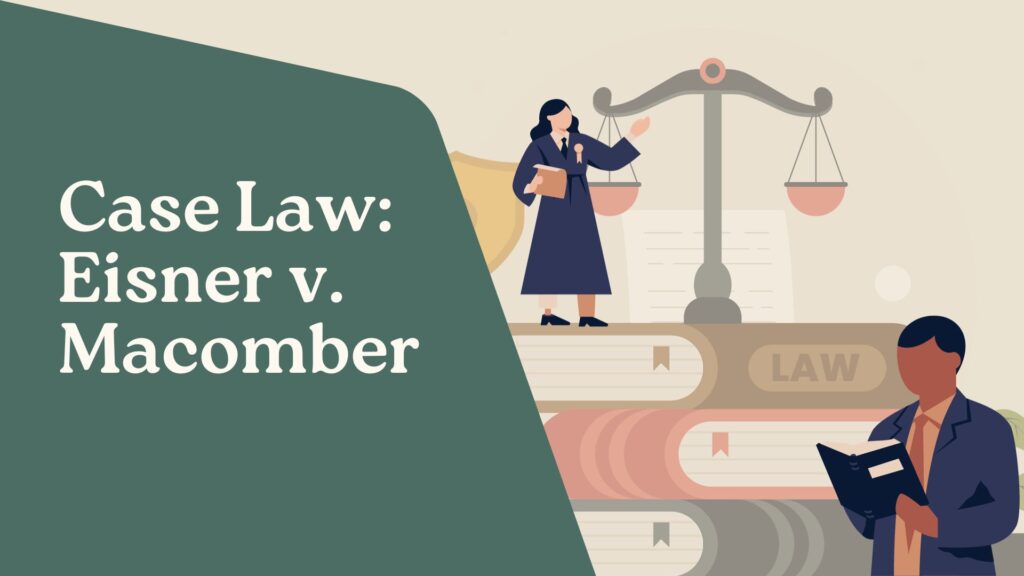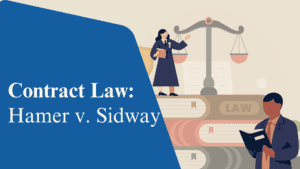Eisner v. Macomber is a notable United States Supreme Court case that was decided in 1920. Involving issues relating to U.S. tax law, the case is particularly important as it specifically refers to the taxation of stock dividends and whether they can be constituted taxable income.
This article will act as a (brief) case brief of Eisner v. Macomber, offering details of the main parties involved and the facts behind the case, as well as the main issue, holding, rationale, and significance of this case. These details will be followed up with a hypothetical scenario to ensure understanding.
Let’s get into it.

Parties
Plaintiff: Henry M. Eisner
Defendant: Robert Macomber, as the Collector of Internal Revenue
Facts
Henry M. Eisner, the plaintiff, was a stockholder in a corporation called the United States Steel Corporation.
In 1916, the United States Steel Corporation declared a stock dividend, distributing additional shares of its own stock to its existing shareholders.
The Internal Revenue Service (IRS) determined that the value of the stock dividend received by Eisner was taxable income, and assessed a tax on it.
Issue
The main issue in the case was whether a stock dividend could be considered taxable income under the federal income tax laws of the time.
Holding
The Supreme Court, in a unanimous decision, held that stock dividends were not taxable income. The Court ruled that the distribution of additional shares in a corporation to its shareholders did not increase the wealth of the shareholder in a way that would trigger income tax liability.
The Court distinguished between stock dividends and cash dividends, stating that only cash or property payments could be considered taxable income. A stock dividend, in the Court’s view, did not provide the shareholder with any new economic benefit, as it merely represented a reallocation of the shareholder’s existing interest in the corporation.
Rationale
Justice Mahlon Pitney, writing for the Court, explained that for income to be taxable, there must be a gain or profit derived from capital, labor, or both. In the case of a stock dividend, no such gain or profit was realized by the shareholder, as it did not represent an economic benefit or an increase in the shareholder’s capital investment.
The Court’s decision relied on the principle that taxation should be based on economic reality rather than mere bookkeeping entries. It concluded that the increase in the number of shares did not change the shareholder’s proportionate interest in the corporation.
Significance
Eisner v. Macomber is a significant case in the history of U.S. tax law. It established the principle that stock dividends are not taxable as income, and this principle has been influential in subsequent tax cases.
The case clarified the distinction between stock dividends and cash dividends in terms of tax treatment, emphasizing the importance of economic substance in determining tax liability.
It’s important to note that U.S. tax laws and interpretations may change over time, so the impact and relevance of Eisner v. Macomber may too have evolved since the original outcome in 1920.
Hypothetical Scenario
An example of the application of the principles established in Eisner v. Macomber can be found in the context of modern tax law, particularly in determining the tax treatment of stock dividends. While the case itself focused on tax law in the early 20th century, its principles have continued to influence tax decisions and regulations. Here’s how it might apply today:
Scenario
Let’s say an individual named Alice is a shareholder in a technology company called TechCorp. TechCorp has been performing well, and to reward its shareholders, the company declares a stock dividend. As a result of the stock dividend, Alice receives additional shares of TechCorp stock.
Application of Eisner v. Macomber:
In this scenario, Eisner v. Macomber principles would still apply, even in a modern context, meaning that the stock dividend received by Alice should not be considered taxable income for federal income tax purposes. Here’s why:
- Economic Substance: The key factor is whether the stock dividend provides an economic benefit or an increase in the shareholder’s wealth. Similar to the situation in Eisner v. Macomber, the stock dividend in this case doesn’t provide Alice with any new economic benefit. It’s essentially a reallocation of her ownership interest in TechCorp.
- No Cash or Property Received: Taxable income typically involves the receipt of cash or property that can be used to meet financial needs or increase one’s wealth. A stock dividend doesn’t provide the shareholder with cash or property; it merely increases the number of shares held.
- Proportionate Interest: The stock dividend doesn’t change Alice’s proportionate interest in TechCorp. She still owns the same percentage of the company; the only change is in the number of shares she holds.
- Tax on Capital Gains: If Alice were to sell the additional shares received in the stock dividend at a later date, she might be subject to capital gains tax based on the difference between the selling price and her original cost basis in the shares.
So, under the principles of Eisner v. Macomber, Alice should not have to pay income tax on the stock dividend she received from TechCorp.
Conclusion
The precedent from this case law example of Eisner v. Macomber continues to guide how stock dividends are treated in the U.S. tax system, distinguishing them from taxable income events and reinforcing the importance of economic substance in taxation.
In other words, this is a typical case law example that students of tax law will study at university.
Get ahead of the game with Covert Profession’s helpful case briefs for law students or those simply interested in expanding their knowledge of the US’ legal system. With plenty of articles on law-related content, plus some merging into business industries, there’s much to explore!
As a final note though, please remember that it’s essential to consult with a tax professional to consider the specific details of the tax code as tax laws can change, even if they were accurate at the time of writing this article, and there may be exceptions or additional considerations in individual cases.

Comments
Pingback: Law Case: Old Colony Trust Co. v. Commissioner - CovertProfession